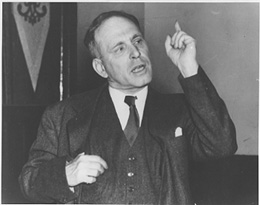In July 1935, the American Civil Liberties Union (ACLU) establishes a chapter in Seattle. The group starts work by defending the organizing rights of labor unions, and by obtaining injunctions against the Washington State Patrol from interfering with peaceful picketing. A committee of supporters had been sporadically active in Seattle since 1920 and the ACLU had won important civil rights cases in Washington state.
In 1920, Roger Nash Baldwin (1884-1981) helped found the American Civil Liberties Union in New York City. This organization was an outgrowth of his defense of St. Louis men prosecuted for being conscientious objectors during World War I (he spent a year in prison himself for refusing induction). The ACLU expanded its mission to safeguarding free speech and the free assembly rights of citizens. That same year, Baldwin visited Seattle to assist in organizing a branch in Washington.
On June 7, 1920, a letter from the ACLU invited supporters to attend a meeting on Saturday, June 12, 1920 in Wolf's Cafeteria, at 813 2nd Avenue in downtown Seattle. A local committee was formed with a goal of 100 members, but it would be years before membership achieved that level. The committee met weekly. During this period, trade unionists and radicals were being prosecuted under state criminal syndicate laws passed during World War I. No formal chapter was organized though.
In 1925, the ACLU national office handled the case of Russell Tremain of Bellingham. The 9-year-old was taken from his parents and put up for adoption when he refused to make the Pledge of Allegience because of his family's pacifist religious beliefs. In 1931, the organization took on the case of C. F. Midgard whose copy of the book The Sexual Life in its Biological Significance was seized by U.S. Customs in Seattle as being pornographic. The ACLU won both cases.
In 1931, the local committee was reinvigorated by University of Washington student Ed Henry, who became chairman. Office space was donated by Seattle attorney Marion Zioncheck, who would later be elected to Congress. The committee defended strikers arrested for unlawful assembly, fought loyalty oaths required of teachers, and supported the removal of military training at the University of Washington.

